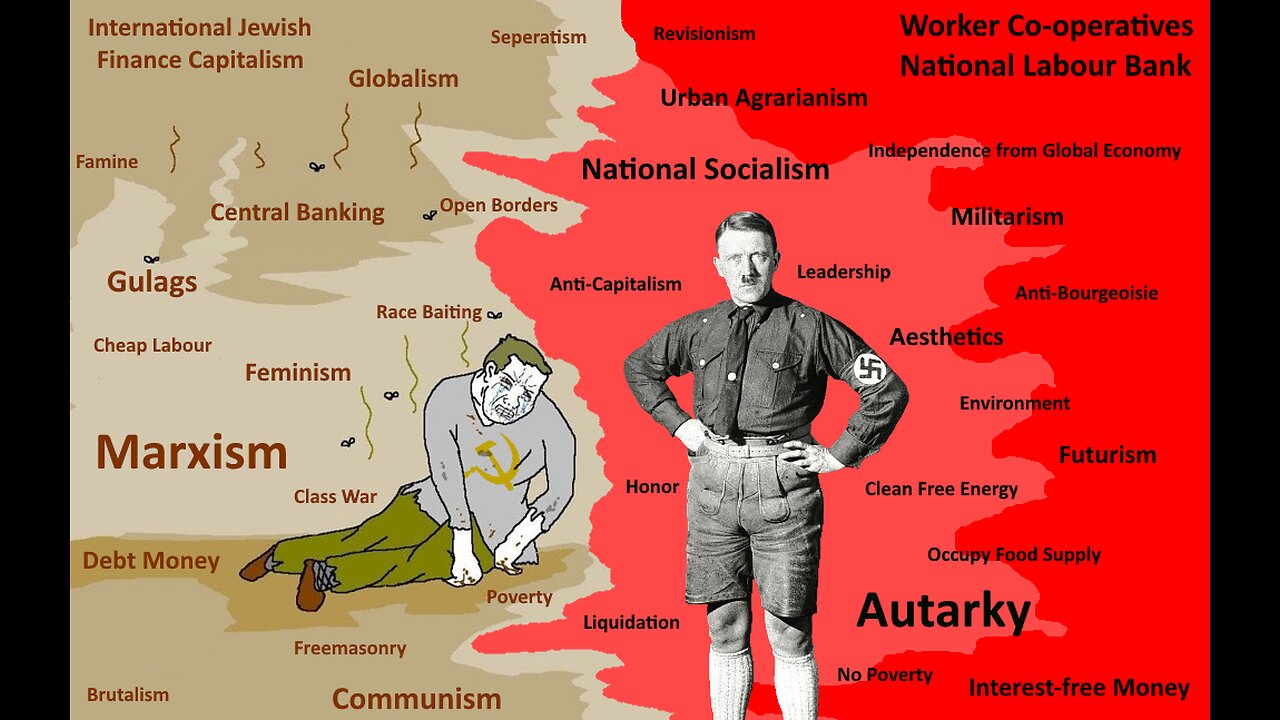Premium Only Content

What is National Socialism? - Matthew Heimbach
THE MORAL, social, and philosophical bankruptcy of our modern political/economic ideologies is becoming more apparent by the day. Free-market capitalism, conventional socialism, democracy, and communism are all demonstrable failures. All fail to sustain and uplift humanity; they fail to acknowledge racial realities; and they fail to establish a balanced and sustainable relationship with Nature. Political corruption, widespread fraud, unprincipled spinelessness, moral and spiritual decay, and blatant self-enrichment mark the current systems of nearly all developed nations on Earth. All seemingly compete in a race to the bottom, to see which can achieve the most undignified and degrading form of social existence in the shortest period of time.
In the past 100 years, only one system has proven able to defy this trend: Adolf Hitler’s National Socialism (1933-1945). National Socialist (NS) Germany was able to achieve, in a period of less than 10 years, unprecedented and remarkable gains in economics, military power, social and cultural advancement, and national morale — and all amidst a global depression that was utterly crushing other advanced nations. Hitler’s system proved such a threat to the other world powers, and especially to the Jewish oligarchy that ruled in Europe and America, that they became determined to destroy it. And destroy it they did.
The threat from Hitler was never military — he never sought war with the West, and always only wanted to move east, in order to acquire badly-needed living space for his people, and to counter the looming Judeo-Bolshevist threat in the Soviet Union. Rather, the threat was Germany’s success: that Hitler might prove to the world that by driving out the Jewish element, by refocusing economies inward, and by promoting a non-materialistic worldview that extolled human character and spirit, that he would expose the many failings of Western Jewish-capitalist-materialistic society. This positive counter-example was something that the Western powers simply could not countenance, and so they conspired to destroy Hitler and his nascent society. In May of 1945, after five long years of fighting, with the entire industrial world arrayed against one nation, they prevailed.
The Allies defeated NS Germany, but not its ideas. Ideas, as they say, are bulletproof. They are eternal and immortal. Hitler’s vision still lives, and it has the power and potential to restore the world to a semblance of sanity, sustainability, and justice. This essay briefly outlines what National Socialism is, what a NS nation might look like today, and offers a few preliminary steps toward achieving such a vision.
What is National Socialism?
National Socialism is, of course, a conjunction of nationalism and socialism. Nationalism is any tendency to favor one’s own nation or nationality, as opposed to outsiders, foreigners, or those of other ethnicities or races. It typically involves national independence, self-reliance, strong self-determination, and a robust sense of patriotism. A nationalist is usually concerned to have a military capable of self-defense (but not empire-building), to have an economy and a currency that operate independently of other nations, and to emphasize traditional culture and social norms. A ‘nation,’ in turn, is literally a breed, stock, or race of people. The word derives from the Latin nasci or natus, ‘to be born.’ A nation, then, is a group of people who are genetically related, of common ancestry, and who comprise a unified ethnicity. Nationalism works for the sole interest of the dominant ethnicity.
The opposite of nationalism is ‘internationalism’ — that is, globalism. Internationalists, such as those who predominate in the West today, promote global trade, global treaties and business pacts, currency unification, and active involvement in foreign affairs. In the old days, they pushed for colonialism. Today they promote international business practices (such as low-cost labor in third-world countries), and they like to project military power around the world and to engage in so-called ‘nation building.’ Being unconcerned with ethnic unity or national homogeneity, globalists advocate for mass immigration, interracial marriage, racial equality, and multiculturalism — none of which are historically or biologically natural, and all of which are proven detriments to the national majority.
Socialism — loosely defined as any system in which the government owns or controls large sectors of the economy — is widely practiced around the world, often in a kind of partnership with capitalist activities. Socialism is not a single entity but rather a spectrum of political and economic positions that can range from relatively unobtrusive to highly active and controlling. Socialism tends to benefit society as a whole, especially the middle and lower classes, whereas capitalism tends to benefit capital — i.e. the wealthy, and in practice, wealthy Jews disproportionately.
Hitler found virtue in both nationalism and socialism. He decided that it was necessary, early in his career, to take the small existing German Workers’ Party (DAP) and make it both nationalist and socialist — hence, the NSDAP, or Nationalsozialistische Deutsche Arbeiterpartei. This was neither extreme nor evil; it was simply common sense, for someone who was concerned about the well-being of his fellow Germanic people.
As a movement, Hitler’s National Socialism was remarkably progressive and benign. It was codified in the famous 25 Points that he established a little over 100 years ago, in 1920. Even today, they are highly relevant. They call for equal rights for German people (Points 2 and 9). They give citizens the right to select the laws and governmental structure (6). They abolish war-profiteering (12). They call for corporate profit-sharing with employees (14). They support retirement pensions, a strong middle class, free higher education, public health, maternity welfare, and religious freedom (15, 16, 20, 21, 24). And they explicitly endorse the principle of “Common good before individual good” (24).
On the other hand, only a relatively few points appear threatening or aggressive. They grant citizenship only to ethnic Germans, explicitly denying it to Jews (4). They block further immigration, and compel recent immigrants to leave (8). They seek to prohibit all financial speculation in land (17). More harshly, the plan calls for the death penalty against “traitors, usurers, and profiteers” (18). It demands that the German-language press be controlled only by ethnic Germans — but doesn’t restrict press in other languages (23). And it calls for “a strong central authority in the State” (25), thus being opposed to anything like parliamentarian democracy.
Despite Hitler’s well-known and openly admitted “anti-Semitism,” Jews are only mentioned in passing in the 25 Points. They are banned from citizenship, and therefore from any role in government or the German-language press. Recent (since August 1914) Jewish immigrants, like all immigrants, must leave. And the National Socialist view of religious freedom “fights against the Jewish materialist spirit” (24). But apart from these two references, there is no explicit mention of Jews or any other minorities. There are no threats to imprison or kill Jews. Longtime Jewish residents can stay in the country. There is no confiscation of Jewish wealth, with the stated exceptions. There is no repression of Gypsies or homosexuals. And there is certainly nothing that sounds like a looming ‘Holocaust.’
In sum, Hitler’s National Socialism was essentially the product of German nationalism and progressive socialism, combined with a mild form of opposition to Jewish power. It is hardly the evil that is portrayed. In fact, quite the contrary: It proved itself to be a recipe for astonishing success.
Credit to German Historical Education on X, follow him here : https://x.com/GermanScholarrr
Great follow!!!
-
 2:09:51
2:09:51
Badlands Media
13 hours agoBadlands Daily: Sept. 1, 2025 – Trump vs. Big Pharma, Giuliani Crash, and Mortgage Fraud Fallout
44.4K33 -
 1:12:35
1:12:35
theoriginalmarkz
4 hours agoCoffee with MarkZ. 09/01/2025
43.2K12 -
 2:59:48
2:59:48
Wendy Bell Radio
9 hours agoSunday, Bloody Sunday
127K252 -
 1:10:02
1:10:02
crgoodw1n
3 hours agoHAPPY LABOR DAY! Tactical shoosting W/ @BenderOdoyle Ask about !12hr !freshenup !discord
14.7K2 -
 LIVE
LIVE
ENEMYOFDEATH2012
15 hours agoGod of War Playthrough Pt. 2 and some Fortnite
14 watching -
 4:47:50
4:47:50
The Why Files
3 days agoCOMPILATION: UFOs and Aliens Vol.2 | They are NOT our friends
95.8K54 -
 1:33:46
1:33:46
BubbaMatt
4 hours ago $0.13 earnedMafia Definitive Edition Playthrough - Part 1
5.15K -
 LIVE
LIVE
Jorba4
3 hours ago🔴Live-Jorba4- The Finals
9 watching -
 LIVE
LIVE
Lofi Girl
2 years agoSynthwave Radio 🌌 - beats to chill/game to
199 watching -
 7:05:46
7:05:46
FyrBorne
16 hours ago🔴Warzone M&K Sniping: Finding Season 5's Best Strafe ARs
26.5K